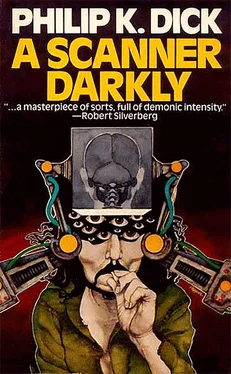“A Swedish person, tall, Swedish name. Male. Served time, wry sense of humor. Big man but thin, carrying a great deal of cash, probably from the split of a shipment earlier this month.”
“I’ll watch for him,” Fred said. “Pounds.” He shook his head, or rather the nebulous blur wobbled.
Hank sorted among his holographic notes. “Well, this one is in jail.” He held up a picture briefly, then read the reverse. “No, this one’s dead; they’ve got the body downstairs.” He sorted on. Time passed. “Do you think the Jora girl is turning tricks?”
“I doubt it.” Jora Kajas was only fifteen. Strung out on injectable Substance D already, she lived in a slum room in Brea, upstairs, the only heat radiating from a water heater, her source of income a State of California tuition scholarship she had won. She had not attended classes, so far as he knew, in six months.
“When she does, let me know. Then we can go after the parents.”
“Okay.” Fred nodded.
“Boy, the bubblegummers go downhill fast. We had one in here the other day—she looked fifty. Wispy gray hair, missing teeth, eyes sunk in, arms like pipe cleaners … We asked her what her age was and she said ‘Nineteen.’ We double-checked. ‘You know how old you look?’ this one matron said to her. ‘Look in the mirror.’ So she looked in the mirror. She started to cry. I asked her how long she’d been shooting up.”
“A year,” Fred said.
“Four months.”
“The street stuff is bad right now,” Fred said, not trying to imagine the girl, nineteen, with her hair falling out. “Cut with worse garbage than usual.”
“You know how she got strung out? Her brothers, both of them, who were dealing, went in her bedroom one night, held her down and shot her up, then balled her. Both of them. To break her in to her new life, I guess. She’d been on the corner several months when we hauled her in here.”
“Where are they now?” He thought he might run into them.
“Serving a six-month sentence for possession. The girl’s also got the clap, now, and didn’t realize it. So it’s gone up deep inside her, the way it does. Her brothers thought that was funny.”
“Nice guys,” Fred said.
“I’ll tell you one that’ll get you for sure. You’re aware of the three babies over at Fairfield Hospital that they have to give hits of smack to every day, that are too young to withdraw yet? A nurse tried to—”
“It gets me,” Fred said in his mechanical monotone. “I heard enough, thanks.”
Hank continued, “When you think of newborn babies being heroin addicts because—”
“Thanks,” the nebulous blur called Fred repeated.
“What do you figure the bust should be for a mother that gives a newborn baby a joypop of heroin to pacify it, to keep it from crying? Overnight in the county farm?”
“Something like that,” Fred said tonelessly. “Maybe a weekend, like they do the drunks. Sometimes I wish I knew how to go crazy. I forget how.”
“It’s a lost art,” Hank said. “Maybe there’s an instruction manual on it.”
“There was this flick back around 1970,” Fred said, “called The French Connection , about a two-man team of heroin narks, and when they made their hit one of them went totally bananas and started shooting everyone in sight, including his superiors. It made no difference.”
“It’s maybe better you don’t know who I am, then,” Hank said. “You could only get me by accident.”
“Somebody,” Fred said, “will get us all anyhow eventually.”
“It’ll be a relief. A distinct relief.” Going farther into his pile of notes, Hank said, “Jerry Fabin. Well, we’ll write him off. N.A.C. The boys down the hail say Fabin told the responding officers on the way to the clinic that a little contract man three feet high, legless, on a cart, had been rolling after him day and night. But he never told anybody because if he did they’d freak and get the hell out and then he’d have no friends, nobody to talk to.”
“Yeah,” Fred said stoically. “Fabin has had it. I read the EEG analysis from the clinic. We can forget about him.”
Whenever he sat facing Hank and did his reporting thing, he experienced a certain deep change in himself. Afterward was when he usually noticed it, although at the time he sensed that for a reason he assumed a measured and uninvolved attitude. Whatever came up and whoever it was about possessed no emotional significance to him during these sessions.
At first he had believed it to be the scramble suits that both of them wore; they could not physically sense each other. Later on he conjectured that the suits made no actual difference; it was the situation itself. Hank, for professional reasons, purposefully played down the usual warmth, the usual arousal in all directions; no anger, no love, no strong emotions of any sort would help either of them. How could intense natural involvement be of use when they were discussing crimes, serious crimes, committed by persons close to Fred and even, as in the case of Luckman and Donna, dear to him? He had to neutralize himself; they both did, him more so than Hank. They became neutral; they spoke in a neutral fashion; they looked neutral. Gradually it became easy to do so, without prearrangement.
And then afterward all his feelings seeped back.
Indignation at many of the events he had seen, even horror, in retrospect: shock. Great overpowering runs for which there had been no previews. With the audio always up too loud inside his head.
But while he sat across the table from Hank he felt none of these. Theoretically, he could describe anything he had witnessed in an impassive way. Or hear anything from Hank.
For example, he could offhandedly say “Donna is dying of hep and using her needle to wipe out as many of her friends as she can. Best thing here would be to pistol-whip her until she knocks it off.” His own chick … if he had observed that or knew it for a fact. Or “Donna suffered a massive vasoconstriction from a mickey-mouse LSD analogue the other day and half the blood vessels in her brain shut down.” Or “Donna is dead.” And Hank would note that down and maybe say “Who sold her the stuff and where’s it made?” or “Where’s the funeral, and we should get license numbers and names,” and he’d discuss that without feeling.
This was Fred. But then later on Fred evolved into Bob Arctor, somewhere along the sidewalk between the Pizza Hut and the Arco gas station (regular now a dollar two cents a gallon), and the terrible colors seeped back into him whether he liked it or not.
This change in him as Fred was an economy of the passions. Firemen and doctors and morticians did the same trip in their work. None of them could leap up and exclaim each few moments; they would first wear themselves out and be worthless and then wear out everyone else, both as technicians on the job and as humans off. An individual had just so much energy.
Hank did not force this dispassion on him; he allowed him to be like this. For his own sake. Fred appreciated it.
“What about Arctor?” Hank asked.
In addition to everyone else, Fred in his scramble suit naturally reported on himself. If he did not, his superior—and through him the whole law-enforcement apparatus—would become aware of who Fred was, suit or not. The agency plants would report back, and very soon he as Bob Arctor, sitting in his living room smoking dope and dropping dope with the other dopers, would find he had a little threefoot-high contract man on a cart coasting after him, too. And he would not be hallucinating, as had been Jerry Fabin.
“Arctor’s not doing anything much,” Fred said, as he always did. “Works at his nowhere Blue Chip Stamp job, drops a few tabs of death cut with meth during the day—”
Читать дальше








